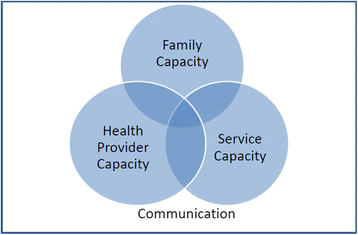A qualitative study of health care providers' perceptions and experiences of working together to care for children with medical complexity (CMC)
- PMID: 29386026
- PMCID: PMC5793356
- DOI: 10.1186/s12913-018-2857-8
A qualitative study of health care providers' perceptions and experiences of working together to care for children with medical complexity (CMC)
Abstract
Background: Children with medical complexity (CMC) have a wide range of long term health problems and disabilities that have an adverse impact on their quality of life. They have high levels of family identified health care needs and health care utilisation. There is no Australian literature on the experiences of health care providers working in the Australian tertiary, secondary and primary health care system, whilst managing CMC. This information is essential to inform the design of integrated health care systems for these children. We address this knowledge gap by exploring the perceptions and experiences of health care providers on the provision of health care for CMC aged 0 to 18 years.
Method: A qualitative research study was undertaken. Stakeholder forums, group and individual in depth interviews were undertaken using a semi-structured interview guide. The stakeholder forums were audio recorded and transcribed verbatim. Field notes of the stakeholder forums, group and individual interviews were taken. Inductive thematic analysis was undertaken to identify key themes.
Results: One hundred and three providers took part in the stakeholder forums and interviews across 3 local health districts, a tertiary paediatric hospital network, and primary health care organisations. Providers expressed concern regarding family capacity to negotiate the system, which was impacted by the medical complexity of the children and psychosocial complexity of their families. Lack of health care provider capacity in terms of their skills, time and availability to manage CMC was also a key problem. These issues occurred within a health system that had impaired capacity in terms of fragmentation of care and limited communication among health care providers.
Conclusion: When designing integrated care models for CMC, it is essential to understand and address the challenges experienced by their health care providers. This requires adequate training of providers, additional resources and time for coordination of care, improved systems of communication among services, with timely access to key information for parents and providers.
Keywords: Child; Children with medical complexity (CMC); Health provider; Qualitative.
Conflict of interest statement
Ethics approval and consent to participate
Ethical and research governance approval for this project was obtained from the Sydney Children’s Hospitals Network Human Research Ethics Committee (HREC Reference: LNR/15/SCHN/299). All participants received an information sheet and signed a consent form.
Consent for publication
Not applicable.
Competing interests
None of the authors had competing interests.
Publisher’s Note
Springer Nature remains neutral with regard to jurisdictional claims in published maps and institutional affiliations.
Similar articles
-
Children with medical complexity care journey during COVID-19 from providers perspective: a qualitative study.BMC Health Serv Res. 2025 May 22;25(1):740. doi: 10.1186/s12913-025-12857-9. BMC Health Serv Res. 2025. PMID: 40399952 Free PMC article.
-
Between equilibrium and chaos, with little restitution: a narrative analysis of qualitative interviews with clinicians and parent carers of children with medical complexity.BMC Health Serv Res. 2024 Apr 23;24(1):504. doi: 10.1186/s12913-024-10973-6. BMC Health Serv Res. 2024. PMID: 38654202 Free PMC article.
-
Delineating family needs in the transition from hospital to home for children with medical complexity: part 2, a phenomenological study.Orphanet J Rare Dis. 2023 Dec 12;18(1):387. doi: 10.1186/s13023-023-02747-w. Orphanet J Rare Dis. 2023. PMID: 38082332 Free PMC article.
-
Caregiver and Health Care Provider Perspectives on Cloud-Based Shared Care Plans for Children With Medical Complexity.Hosp Pediatr. 2018 Jul;8(7):394-403. doi: 10.1542/hpeds.2017-0242. Epub 2018 Jun 5. Hosp Pediatr. 2018. PMID: 29871887 Free PMC article.
-
Family Experiences of Integrated Care for Children With Medical Complexity: A Scoping Review.Child Care Health Dev. 2025 May;51(3):e70091. doi: 10.1111/cch.70091. Child Care Health Dev. 2025. PMID: 40329672 Free PMC article.
Cited by
-
Evaluating case management for caregivers of children with spinal muscular atrophy type I and II-an exploratory, controlled, mixed-methods trial.Front Pediatr. 2023 Sep 20;11:1212012. doi: 10.3389/fped.2023.1212012. eCollection 2023. Front Pediatr. 2023. PMID: 37808564 Free PMC article.
-
Evaluation of a Case Management to Support Families With Children Diagnosed With Spinal Muscular Atrophy-Protocol of a Controlled Mixed-Methods Study.Front Pediatr. 2021 Aug 3;9:614512. doi: 10.3389/fped.2021.614512. eCollection 2021. Front Pediatr. 2021. PMID: 34414138 Free PMC article.
-
Provision of care for children with medical complexity in tertiary hospitals in England: qualitative interviews with health professionals.BMJ Paediatr Open. 2023 Jul;7(1):e001932. doi: 10.1136/bmjpo-2023-001932. BMJ Paediatr Open. 2023. PMID: 37451703 Free PMC article.
-
Implementation of a multidisciplinary discharge videoconference for children with medical complexity: a pilot study.Pilot Feasibility Stud. 2020 Feb 18;6:27. doi: 10.1186/s40814-020-00572-7. eCollection 2020. Pilot Feasibility Stud. 2020. PMID: 32099662 Free PMC article.
-
Psychosocial assessment of adolescents and young adults in paediatric hospital settings: patient and staff perspectives on implementation of the e-HEEADSSS.BMC Health Serv Res. 2023 Jun 22;23(1):683. doi: 10.1186/s12913-023-09621-2. BMC Health Serv Res. 2023. PMID: 37349759 Free PMC article.
References
-
- Nageswaran S, Golden SL. Factors associated with stability of health nursing Services for Children with Medical Complexity. Home healthcare now. 2017;35(8):434–444. - PubMed
Publication types
MeSH terms
Grants and funding
LinkOut - more resources
Full Text Sources
Other Literature Sources
Medical
Miscellaneous


